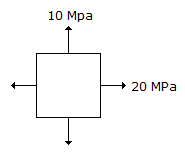Civil Engineering :: UPSC Civil Service Exam Questions
-
What is the correct sequence of the following events in rock tunnelling :
1. Marking tunnel profile
2. Loading explosive and blasting
3. Checking misfire
4. Muking
5. Removing foul gas
6. Setting up and drilling
7. Gunnisting
Select the correct answer using the codes given below : -
Which of the following are the criteria associated with the design of sag vertical curve ?
1. Provision of minimum stopping distance during day time
2. Adequate drainage
3. Comfortable operation
4. Pleasant appearance
Select the correct answer using the codes given below: -
Which one of the following is the correct statement ?
Refractory bricks resist: -
The following quantities refer to a channel section used as a beam :
b = width of flange (upto centre of web thickness).
h = depth of web (c/c of flange thickness).
t = thickness of flange and web.
I = moment of inertia of channel about xx axis.
e = distance of shear centre, outside the channel from the mid thickness of the web.
The value of 'e' is given by -
Which of the following statements is NOT correct ?
-
The velocity distribution for flow over a plate is given by u = 0.5 y - y2 where u is the velocity in m/s at a distance y metre above the plate. If the dynamic viscosity of the fluid is 0.9 N/m2, then what is the shear stress at 0.20 m from the boundary?
-
Consider the following :
1. Initial consolidation.
2. Primary consolidation.
3. Secondary consolidation.
4. Final consolidation.
The three stages which would be relevant to consolidation of a soil deposit includes -
Consider the following statements :
1. Mastic asphalt is a mixture of hard grade bitumen or blown bitumen, minerals filter and fine aggregates.
2. % of binder content in the mastic asphalt is 17-20 percent by weight of the aggregates. Which of the statements given above is/are correct ? -
An element is subjected to stress as given in figure. For this state of stress, what is the maximum shear stress ?

-
What is the maximum possible value of Poisson's ratio for a non-dilatant material ?
|
A.
Chlorides in potable water may be present from 300 ppm to 500 ppm.
|
|
B.
In order to be safe against pathogenic bacteria residual chlorine should remain between 0.05 ppm and 0.20 ppm.
|
|
C.
Presence of iron and maganese in excess of 0.3 ppm in dirinking water is objectionable.
|
|
D.
pH value for pure water is nearly 7.
|


 Whatsapp
Whatsapp
 Facebook
Facebook


